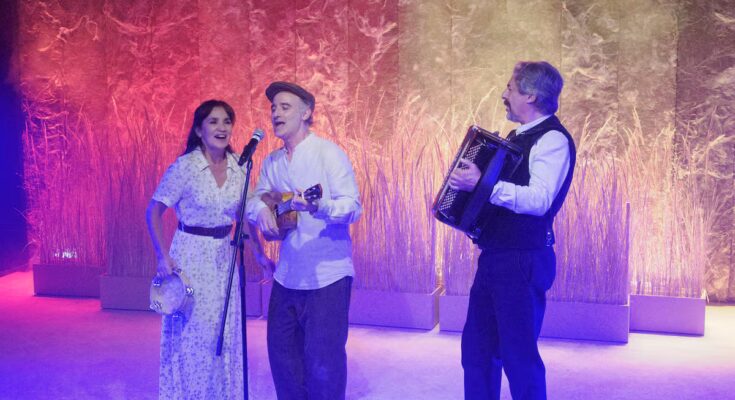When playwright Raúl Losánez thinks of the countryside, that forgotten poet comes to mind. He remembers people reciting verses by José María Gabriel y Galán (1879-1905) in a town in Extremadura – where his mother and father came from -: “But let’s see, Mr. Judge: look if any of them are capable of touching that bed where he died (…). Take everything, everything, except that, those blankets have the sweat of his body (…)”. He was fascinated by the how The embargo, from Salamanca, he truly reached “the soul of the peasant, of the people without possibilities, without studies”, says Losánez.
The 54-year-old from Madrid assures that he likes to talk about universal themes that “are not discussed in the theater, as well as saving authors who are cornered for reasons that go beyond their talent, their own literature”. From that thought and from the texts of the poet José María Gabriel y Galán – who died at 34 years old – the work was born Aromas of solitude. A tribute to the “rural world and emptied Spain”, which opens this Thursday and will be visible until December 7 at the Fernán Gómez Theater in Madrid.
In writing it, Losánez insists that his vision of the campaign is far from any idealization. It rejects the idea of “being an innocent and naive song to nature”. “The pitch is very hard, it requires a lot of sacrifice,” he explains, “and we demonstrated this throughout the performance.” This duality surrounds the story. An adult woman, played by Carmen del Valle, arrives with her luggage at the farm where she was born and raised. There he evokes his relationship with his father, which Jesús Noguero revives, who is in love with the land. While “she sees the miseries and discrimination” that pushed her to leave, the author underlines.
The dramaturgy takes place on two temporal planes, full of contrasting reflections. He reminds the director, Ana Contreras, Pedro Paramo by Juan Rulfo. With realities converging, others separate. At the same time, a troubadour (Nacho Vera), with his small guitar and drum, acts as narrator: he introduces the characters and scenes. Contreras understood the playwright’s idea from the beginning: “I have the privilege of living in two worlds, of coming from contact with nature,” he says. It was his experience that he wanted to stage. “When I talked to the team, some of them didn’t understand what it meant to see the firefly lights,” he describes, “I want to fill the theater with them.”
The changing lighting while working evokes a warm day in the stubble. And when it goes out, everything is dark. The land in which the story takes place plays an important role. It is not only the place where the protagonists develop, but it becomes a character in conversation: “I am the father, the cradle, the tomb of the workers”. It is this reflection that both Losánez y Contreras and the production company La Otra Arcadia try to convey to the public: “the relationship between man and the earth”. But above all, Losánez points out, people are asking: “What are we doing wrong with the campaign?”
It was the wave of fires that devoured 340,000 hectares of Spanish territory this summer that reaffirmed to Losánez the importance of speaking on the stage of empty Spain. He believes that people forget and “turn the page quickly”: “Half León and half Zamora have burned down… But come on, I miss the subway,” he explains. On the other end of the phone he says that in the city people live “alienated” without time to think, reflect, look at what surrounds them: “There isn’t even time to make mistakes”, he complains.
“Is it normal that we live in three cities and that it takes us as long to get around as it does to go to another province?” Losánez asks. He says the purpose of Aromas of solitude is for people to “connect with their roots”. “We don’t provide solutions,” he says, “but we ask ourselves when we got so wrong in this area.” For him it has always been that place of reflection: “I think that nature, the countryside, allows you to place yourself in a place of humility. When you spend hours alone under a chestnut tree in the middle of the mountain, you say: I’m an ant under a boot”.



